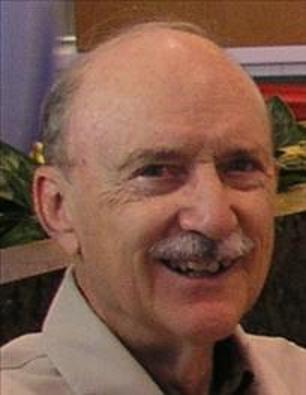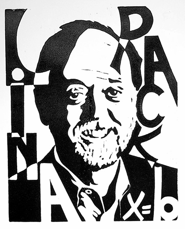My Erdös Number and My Trump Number
I've long known that my Erdös Number is 3. This means that the length of the path on the graph of academic coauthorship between me and mathematician Paul Erdös is 3. Somewhat to my surprise, I recently discovered that I can also trace a chain of coauthorship to Donald J. Trump. My Trump number is 5.
Contents

Collaborative Distance
The collaborative distance between two authors is the length of the path of coauthorship of scientific papers, books, and articles connecting the two. If A and B are coauthors, then the collaborative distance between them is 1. Furthermore, if B and C are also coauthors, then the collaborative distance between A and C is 2. And so on. If there is no chain of coauthorship, then the collaborative distance is infinite.
Erdös Number
Paul Erdös (1911-1996) was the world's most prolific modern mathematician. He wrote 1,523 papers with 511 distinct coauthors. These 511 people have Erdös number equal to 1. And these authors have, in turn, written papers with over 11,000 other people. That means that over 11,000 people have Erdös number of 2. My estimate is that a few hundred thousand people have Erdös number of 3. I'm one of them.
There are two length three paths of coauthorship between me and Erdös. Both go through my thesis advisor, George Forsythe. I wrote a blog post about Forsythe a few years ago. Forsythe has an Erdös number of 2 in two different ways because he wrote papers with his thesis advisor, William Feller, and with Ernst Straus, both of whom had worked directly with Erdös.
An Erdös Number calculator is available at MathSciNet Collaboration Distance. More than you every wanted to know about Erdös numbers is available at the Oakland University Erdös Number Project.
Steve Johnson
Steve Johnson is a buddy of mine who also has Erdös number of 3. His path goes through Jeff Ullman and Ron Graham to Paul Erdös. But that's not why I bring him up today. In the 1970's Steve was part of the group at Bell Labs that developed Unix. He wrote the Unix tool Yacc (Yet Another Compiler Compiler), as well as the original C compiler, PCC, (Portable C Compiler). He is coauthor, along with three other Unix guys, of a paper about C in the 1978 issue of the Bell System Technical Journal that was devoted entirely to Unix.
Steve and I wrote a paper about compiling MATLAB, although the references to that paper on the Internet have my named spelled incorrectly. It is through this paper that I was surprised to find that my collaborative distance from Donald J. Trump is only 5.
Trump Number
Finite Trump numbers are possible because Trump's famous book, "The Art of the Deal", was actually ghost-written by a free-lance writer named Tony Schwartz. And Schwartz has coauthored many articles and books with other people. Some of these articles might not exactly be classified as academic papers, but what the heck.
John Winslow Morgan
The coauthorship path between me and Trump is through articles by John Winslow Morgan, a professor in the Harvard Business School who specializes in the history of technology. He has written articles with Schwarz and with Dennis Ritchie, one of the originators of Unix.
So, the path of length 5 is Moler - Johnson - Ritchie - Morgan - Schwartz - Trump.
References
Erdös Number
Forsythe, G. E. and Straus, E. G. On best conditioned matrices. Proc. Amer. Math. Soc. 6, (1955). 340–345.
Erdös, P., Lovász, L., Simmons, A., and Straus, E. G. Dissection graphs of planar point sets. A survey of combinatorial theory. (Proc. Internat. Sympos., Colorado State Univ., Fort Collins, Colo., 1971), 139–149. North-Holland, Amsterdam, 1973.
Feller, William, and George E. Forsythe. New matrix transformations for obtaining characteristic vectors. Quarterly of Applied Mathematics 8.4 (1951), 325-331.
Erdös, Paul, William Feller, and Harry Pollard. A property of power series with positive coefficients. Bull. Amer. Math. Soc 55.2 (1949): 201-204.
Forsythe, G. E. and C. B. Moler, Computer Solution of Linear Algebraic Systems, (Series in Automatic Computation) XI + 148, Prentice Hall, Englewood Cliffs, N.J. 1967.
Forsythe, George E., Malcolm, Michael A. and Moler, Cleve B., Computer Methods for Mathematical Computations, (Series in Automatic Computation) XI + 259, Prentice Hall, Englewood Cliffs, N.J. 1977.
Trump Number
Johnson, S. C. and C. Mohler (Moler), Compiling MATLAB, Proceedings of the USENIX Symposium on Very High Level Languages (VHLL), 119-27, Santa Fe, New Mexico, October 1994. USENIX Association.
Ritchie, D. M., Johnson, S. C., Lesk, M. E. and Kernighan, B. W., UNIX Time-Sharing System: The C Programming Language. Bell System Technical Journal, 57: 1991–2019, 1978.
Ritchie, D. M. and Morgan, J. W, The Origins of UNIX, Harvard Business Review, 48: 28-35, 1985.
Morgan, John Winslow and Schwartz, Tony, Does UNIX Have A Future?, MIT Technology Review, 53: 1-8, 1992.
Trump, Donald J. and Schwartz, Tony, The Art of the Deal, Ballantine Books, (paperback), 384 pp., 2004.








Comments
To leave a comment, please click here to sign in to your MathWorks Account or create a new one.